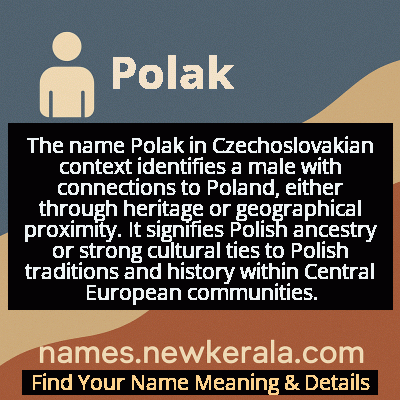Polak Name Meaning & Details
Origin, Popularity, Numerology Analysis & Name Meaning of Polak
Discover the origin, meaning, and cultural significance of the name POLAK. Delve into its historical roots and explore the lasting impact it has had on communities and traditions.
Name
Polak
Gender
Male
Origin
Czechoslovakian
Lucky Number
1
Meaning of the Name - Polak
The name Polak in Czechoslovakian context identifies a male with connections to Poland, either through heritage or geographical proximity. It signifies Polish ancestry or strong cultural ties to Polish traditions and history within Central European communities.
Polak - Complete Numerology Analysis
Your Numerology Number
Based on Pythagorean Numerology System
Ruling Planet
Sun
Positive Nature
Leaders, ambitious, highly driven, self-reliant, innovative.
Negative Traits
Overly aggressive, domineering, impatient, selfish.
Lucky Colours
Red, orange, gold.
Lucky Days
Sunday.
Lucky Stones
Ruby, garnet.
Harmony Numbers
2, 3, 9.
Best Suited Professions
Entrepreneurs, managers, engineers.
What People Like About You
Courage, determination, leadership.
Famous People Named Polak
Polak
Historical Figure
Early bearer of the name in Czech lands, representing Polish-Czech cultural connections
Josef Polák
Educator
Prominent Czech teacher and cultural figure who contributed to education reform
Milan Polák
Athlete
Czech decathlete who represented the nation in international competitions
Václav Polák
Artist
Czech painter known for capturing traditional Slovak landscapes and folk life
Name Variations & International Equivalents
Click on blue names to explore their detailed meanings. Gray names with will be available soon.
Cultural & Historical Significance
In modern times, while primarily remaining a surname, its use as a given name symbolizes appreciation for Slavic unity and serves as a living reminder of the interconnected histories of Central European peoples. The name carries particular resonance in border regions like Silesia and Moravia, where Polish and Czechoslovak cultures have intermingled for generations. It represents a tangible link to the complex tapestry of Central European history, where national identities have often been fluid and interconnected rather than strictly bounded.
Extended Personality Analysis
Individuals named Polak are often perceived as embodying traditional Slavic values of resilience, loyalty, and strong family connections. They tend to be practical, grounded people with a deep sense of cultural identity and historical awareness. The name suggests someone who values tradition while being adaptable to changing circumstances, much like the historical Polish people who maintained their culture through various political changes.
These individuals are typically seen as reliable, hardworking, and possessing a quiet strength that helps them navigate challenges. They often demonstrate a blend of Czech practicality and Polish romanticism, creating a balanced personality that can be both pragmatic and passionate when circumstances require. Their connection to cross-border heritage often makes them natural mediators and bridge-builders between different cultural groups, comfortable in multiple contexts while maintaining a strong sense of personal identity and cultural roots.
Modern Usage & Popularity
In contemporary times, Polak remains predominantly a surname rather than a given name in Czechoslovakian contexts, though it occasionally appears as a first name in families wishing to honor Polish heritage or ancestral connections. Its usage as a given name has declined since the mid-20th century but sees occasional revival among families with strong cross-border ties or those interested in preserving traditional Slavic names. The name is most commonly found in regions with historical Polish populations, particularly in eastern Czech Republic and northern Slovakia, where it serves as a living connection to shared cultural history and family lineages that span modern national boundaries.
Symbolic & Spiritual Meanings
Symbolically, Polak represents bridges between cultures, resilience in maintaining identity, and the enduring connections between Slavic peoples. The name evokes images of borderlands where cultures meet and blend, symbolizing adaptability while maintaining core values. It carries connotations of strength through adversity, reflecting the historical experiences of Polish and Czechoslovak peoples navigating political changes and preserving their cultural heritage across generations despite shifting borders and political systems.

